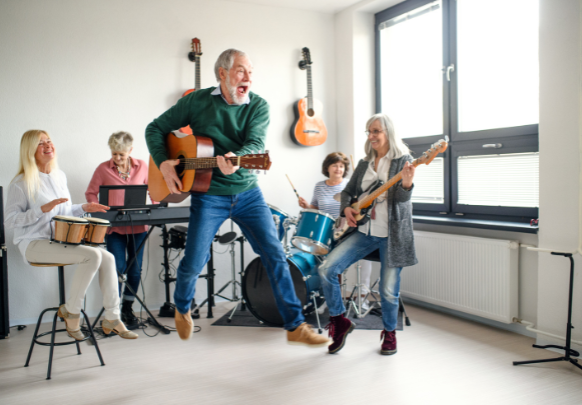Music and Memory: How Tunes Can Boost Senior Wellbeing
We’ve all had the experience of hearing a song and suddenly being transported to a specific time or memory. For seniors, music can be an incredibly powerful tool—not only for enjoyment, but also for emotional connection, relaxation, and memory stimulation.
Lawrence Hobart
4/8/20252 min read


Welcome back to CareTec’s ongoing series on senior health and wellness! We’ve been diving into a wide range of topics that support the mental, emotional, and physical well-being of seniors. With each article, we explore how everyday habits—and a little help from CareTec’s AI-powered tools—can make a big difference in how seniors feel and function.
In our last blog, “Brain Games: Keeping Seniors Mentally Sharp and Engaged,” we looked at how simple, fun games can help maintain cognitive health. From crosswords to card games, we explored how exercising the brain can be both effective and enjoyable.
Today, we’re tuning into something just as powerful—music. Whether it’s a favorite song from the past or a relaxing melody before bed, music has a unique way of reaching into memory and lifting the spirit. Let’s explore how music can support emotional health, spark memories, and bring daily joy to seniors.
Music and Memory: How Tunes Can Boost Senior Wellbeing
We’ve all had the experience of hearing a song and suddenly being transported to a specific time or memory. For seniors, music can be an incredibly powerful tool—not only for enjoyment, but also for emotional connection, relaxation, and memory stimulation.
Why Music Matters for Seniors
Music can do more than just entertain. For older adults, it offers a range of health benefits:
Enhances mood and reduces stress – Music has a calming effect that can reduce anxiety, elevate mood, and even help manage symptoms of depression.
Supports memory recall – Especially for seniors with dementia or Alzheimer’s, familiar tunes can trigger personal memories and encourage interaction.
Encourages physical movement – Upbeat music often leads to spontaneous movement—whether it’s toe-tapping, dancing, or swaying. That light movement can be good for physical health too!
Fosters connection – Singing along, sharing playlists, or attending music sessions creates opportunities for social engagement.
Easy Ways to Add Music to a Senior’s Day
Incorporating music into a daily routine is simple—and highly rewarding. Here are a few suggestions:
Create themed playlists – Put together a collection of songs from the senior’s youth or favorite genre for easy listening throughout the day.
Start the day with a tune – Playing light, upbeat music in the morning can help energize and set a positive tone.
Use music during mealtimes or activities – Soft background music can enhance the atmosphere and make everyday routines more enjoyable.
Join a sing-along or music group – Whether virtual or in-person, these sessions are a great way to enjoy music with others.
Encourage dancing or clapping – Even small movements to the rhythm of music are great for both mood and motor coordination.
When to Be Mindful
While music is generally safe and beneficial, it’s important to consider individual sensitivities:
Volume matters – Some seniors may have hearing aids or sound sensitivities, so keep music at a comfortable level.
Song selection – Be mindful of lyrics or songs that may evoke difficult memories. Choose tunes that are positive and uplifting.
Fatigue or overstimulation – Especially for those with cognitive impairments, too much stimulation can be overwhelming. Balance music time with periods of quiet.
How Technology Can Help
AI tools can track emotional responses and behavioral cues, helping caregivers see how music impacts a senior’s mood or activity level. There are also a number of music therapy apps and smart speaker features that make it easy to play music on demand—some even personalized to favorite genres or decades.
Disclaimer
This blog is intended for informational purposes only and should not be used as a substitute for professional medical advice, diagnosis, or treatment. If you’re considering music therapy or noticing emotional or behavioral changes, consult a healthcare provider for guidance.
©2025 CareTec.AI
Melbourne: 101 Collins St Melbourne VIC 3000 +613 9999 7379
Sydney: 2 Chifley Square, Sydney NSW 2000 +612 8880 0307
Queensland: 46 Cavill Ave, Surfers Paradise QLD 4217 +617 3667 7473
Texas: 200 W 6th St, Austin, TX 78701 +1 (737) 7101 776
London: 22 Bishopsgate, London EC2N 4AJ +44 (020) 4577 4024


